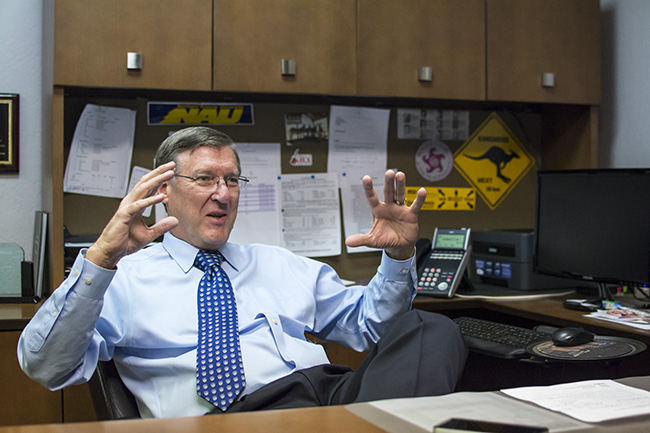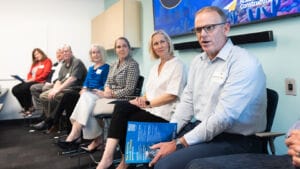The last few years have been turbulent for the construction industry in Arizona. But helping to calm the seas has been Arizona Builders Alliance, which represents more than 270 member companies, including contractors and professional service firms, serving the needs of the commercial and industrial construction industry.
And leading ABA through the industry’s roller-coaster ride has been Executive Director Mark Minter. AZRE sat down with Minter to talk about everything from the need for more apprentice programs to the need to defeat weed.
AZRE: How’s business?
Mark Minter: Improving. We’ve survived the Great Recession. The construction industry in Arizona suffered about a 50 percent loss in volume and employment. We are starting to claw our way out of that. We’re trailing the rest of the country a little bit right now. The West Coast and Mid-Atlantic states and anyplace where there was oil coming out of the ground seemed to come out of the recession a lot faster than we did, but we’re starting to see new contracts come along and people are hiring again and we’re sucking up the college graduates in the construction management and engineering programs as fast as we can hire them. Starting at the trade level, we are trying to find good people to get ready for the work that’s coming later this summer and in the next couple years.
AZRE: What sectors are the strongest?
MM: The biggest sector has been multifamily. We are building apartments and condos like crazy, perhaps creating another bubble in that market. I don’t know what rents are going to be like two or three years from now when those are all on the market competing with each other. The data center market has been very good and expanding and adding new facilities.
AZRE: The state has made it very attractive for data centers to set up shop here with the Computer Data Center Program. How has that helped your industry?
MM: We have benefitted disproportionately from that in Arizona. A lot of data centers have been built here and we’ve seen the repurposing of other facilities like the Apple data center. They are very low-key projects. Nobody quite knows what they are when they are being built, yet they create millions of dollars in construction activity.
AZRE: Where is the construction industry still struggling?
MM: Some of the traditional markets like public works continues to be weak. School districts that depend on property values to have a base to build new schools are still scratching their heads and trying to figure out how to tear down old schools and build new ones. The Legislature has still been somewhat stingy in funding things like the school facilities board or new projects at the state universities. They are beginning to restore some money — restore is the wrong word; not taking money from transportation funding is more accurate — and seeing some projects coming along like the South Mountain Freeway.
AZRE: What are the trends you’re seeing that are impacting the construction industry in Arizona?
MM: We are seeing less public work, less retail. Arizona has enjoyed tremendous growth and that has historically caused us to build a lot of regional shopping centers, but the regional shopping center as we know it may be a dinosaur and may not exist in 20 years as retail patterns shift. So we may not build any new ones, but we will repurpose the old ones.
AZRE: What are the biggest issues facing your industry in Arizona?
MM: There is an absolute regulatory tsunami coming at us from the federal level. There doesn’t seem to be any new regulation that isn’t a good idea — the environment, labor, safety. We are even seeing people in positions like mine possibly having to register with the Department of Labor as “labor persuaders,” under the theory that I might give advice to someone who thinks they may have a labor issue. So I might have to become a regulated labor persuader. I don’t even know what that is, but I might have to register as one with the federal government.
AZRE: How does this “regulatory tsunami” impact your industry?
MM: It drives up the administrative costs for everybody. Having to hire someone to help you understand the new labor laws and environmental issues causes your costs to go up. Even having to hire another clerk to fill out the added forms is a $50,000 or $60,000 commitment for a company.
AZRE: Are there issues in the political arena that are of concern to your industry?
MM: The possibility of having a marijuana initiative on the November ballot is a very interesting conversation for people in our industry. We tend to be rather Libertarian in our views of people’s personal conduct, but the Regulation and Taxation of Marijuana Act (RTMA) includes changes in Arizona’s labor laws that prevent employers from taking action against people who may be using or are under the influence of marijuana. This affects public safety workers, public employees, utilities and this gives us serious concerns about our ability to run drug-free workplaces. It elevates marijuana to a status above alcohol. This might encourage people to use marijuana instead of having a drink.
In addition, federal contractors are required to take steps to have a drug-free workplace as a condition of their contract. The procedures necessary to have a drug-free workplace would be illegal under the RTMA. Federal contractors would either be in violation of their contract terms or the RTMA.
AZRE: What is ABA doing to voice its concerns over the marijuana initiative?
MM: The Arizona Builders Alliance board of directors has approved a contribution of $5,000 to help defeat the RTMA. We strongly encourage ABA members to contribute to this effort. It’s going to be an interesting challenge.
AZRE: How does educating your members fit into the mission of ABA?
MM: Management education is one of the three principal things we do, along with craft training and government relations. Even people with college degrees in construction management, engineering or architecture are only prepared to go so far in their careers. To move beyond the operations side and to get into the management side, executive side or ownership requires a whole different skill set that they don’t get in college.
There isn’t enough time in four years to learn about strategic thinking, the impact of the world economy and other issues. We try to help bring people to that next stage of leadership. We are seeing a resurgence in that right now. We’ve got classes in a variety of areas that are just packed as people prepare themselves to move up in the world.
AZRE: What were some of the ABA’s legislative wins during the last session?
MM: We got involved with the Sunset Review of the Industrial Commission of Arizona. There was actually a move afoot to get rid of the Industrial Commission, which is where all our workman’s comp claim processes are managed and where state OSHA is housed. We just fought a big battle a couple years ago to preserve state OSHA. So it was important to us to keep the Industrial Commission.
We also had a bill that undid a court decision. We have a process in Arizona where people have public works bonds they can make claims against if they are not paid. The court kind of unraveled the notice process on that, so we went in and restored that and made it a simpler, more economic process. It didn’t really change the claim process, it just made it easier to preserve their rights to claim.
AZRE: What are some of the ABA’s legislative priorities that will be coming up in the next session?
MM: We are going to be looking at the Transaction Privilege Tax. We are going to try to get that cleared up to get rid of prime contracting tax classification, which is the strange way we have of collecting sales tax on projects in Arizona and do what other states do, which is you pay the sales tax when you buy the material. That seems to work almost everywhere else in the country and we hope it will work here. It’s hard to differentiate between a contractor buying a two-by-four and you or I buying a two-by-four. Whether that’s done through economic modeling or self-identification, we will figure it out.
AZRE: What are your goals for ABA over the next five years?
MM: We want to make sure the apprenticeship programs are advanced and doing well. We are looking at adding more instructors and expanding the number of programs we have. On a personal level, I’m hoping to be retired in a few years and we have started outlining a succession planning process. Hopefully, we will have everything arranged so there will be a smooth transition.




